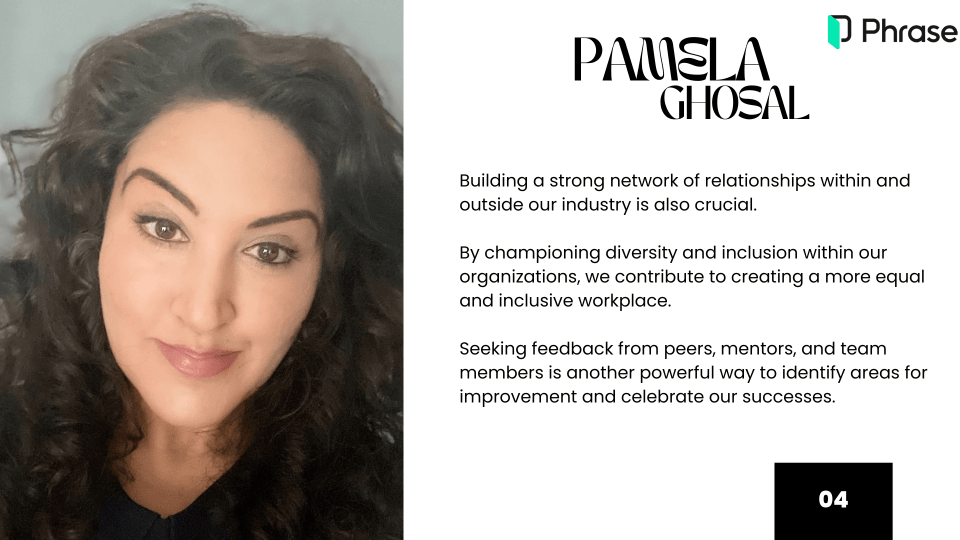Sudipto Ghosh (SG): How can women develop their leadership skills?
Pamela: “Developing leadership skills is a continuous journey that requires dedication, self-awareness, and a willingness to grow. As women, we can face unique challenges due to stereotypes, bias, and a lack of representation in leadership positions. Thankfully this is slowly changing.
To develop professionally, one effective strategy is to seek mentorship and sponsorship from other successful leaders. Their guidance and support can be invaluable in navigating the complexities of leadership roles and the steps to follow wherever you are on your professional journey. Additionally, investing in continuous learning through formal education, workshops, and reading can help us refine our skills and stay ahead in a rapidly changing world.
Building a strong network of relationships within and outside our industry is also crucial. By championing diversity and inclusion within our organizations, we contribute to creating a more equal and inclusive workplace. Seeking feedback from peers, mentors, and team members is another powerful way to identify areas for improvement and celebrate our successes.
Recommended: The ChatGPT Revolution is Coming for Compliance
Above all, we need to embrace our authenticity and lead with integrity, resilience, and confidence. By following these strategies and employing universal principles of effective leadership, we can achieve our full potential as women leaders.
Throughout my career, I have had the privilege of being mentored by individuals who have greatly contributed to my professional growth and development. While these mentors have come from diverse backgrounds, I am particularly grateful for the strong role models and supporters who have played a pivotal role in shaping my leadership journey. Their guidance has provided me with a unique perspective and empowered me to navigate the challenges and obstacles that come with leadership roles. The learning never stops. This is an ongoing journey of continuous development and growth.
I am also a firm believer in the ethos of “paying it forward,” and in my leadership positions, I have made it a priority to mentor and support aspiring women leaders. By sharing my experiences, offering guidance, and providing growth opportunities, I aim to contribute to the professional development and success of others. I consider this to be an integral part of my leadership journey and a way to create positive change in the world.”
SG: How do you push for systemic change around ideas that are new or not that popular?
Pamela: “When it comes to pushing for systemic change around new or unpopular ideas, I believe it is essential to adopt a strategic and multifaceted approach. Firstly, it’s crucial to thoroughly understand and articulate the rationale behind the idea, emphasizing its potential benefits and aligning it with existing business values and goals.
One of the most effective strategies is to engage stakeholders through a process that combines awareness, empirical evidence, and direct involvement, thus ensuring a collective move toward adopting and embracing new concepts.
My experience has underscored the necessity of not only introducing innovative ideas but also effectively navigating the complexities of altering established norms and practices. A crucial aspect of this journey is acknowledging and overcoming resistance, which, in my case, was encountered on a global scale.
A prime example of this was in a previous role I initiated a paradigm shift in the organization from an exclusive reliance on our partner network to championing the adoption of a multichannel customer engagement strategy. This shift was not merely about altering tactics but also about fundamentally transforming our brand’s approach to engagement and visibility with end customers.
The process began with a comprehensive educational campaign aimed at highlighting the inherent benefits and potential of this change. Recognizing the critical role of evidence in supporting advocacy, I spearheaded a pilot project designed to offer a clear, data-driven comparison between the outcomes of a multichannel engagement strategy versus a reliance on the partner network. The pilot was designed to address potential skepticism by demonstrating tangible improvements in market reach, engagement rates, and conversion metrics.
Anticipating and encountering pushback, particularly from global teams accustomed to traditional methodologies, underscored the importance of stakeholder engagement. By involving key players from the outset, seeking their insights, and addressing their concerns, we were able to cultivate a sense of shared ownership over the initiative. This collaborative spirit was pivotal in gradually overcoming resistance and fostering a more receptive attitude toward change.
The introduction of pilot programs served as a strategic maneuver to accumulate quick wins. These early successes were instrumental in building confidence in the new approach, demonstrating its viability and effectiveness with minimal risk. The initiative’s scalability was carefully managed, allowing for iterative learning and adaptation.
To sustain the momentum of change, I advocated for the creation of a culture that rewards innovation, experimentation, and a genuine openness to new ideas. This involved setting up a ‘test and learn’ fund, which empowered teams to explore innovative marketing strategies, without the looming fear of failure.
Leadership played a critical role throughout this transformative journey.
By actively participating in the strategic planning and execution phases, and maintaining transparent communication and feedback loops, I aimed to exemplify the commitment to change. Regular updates on our progress and adaptations based on learning helped in keeping the team aligned and motivated.
This experience, particularly the global pushback encountered, taught me valuable lessons about the dynamics of driving systemic change. It highlighted the importance of patience, strategic planning, and the ability to pivot as necessary. By employing a multifaceted approach that emphasizes education, evidence, empathy, and engagement, we were able to not only navigate the resistance but also pave the way for a significant shift in our organizational culture and strategic outlook.”


